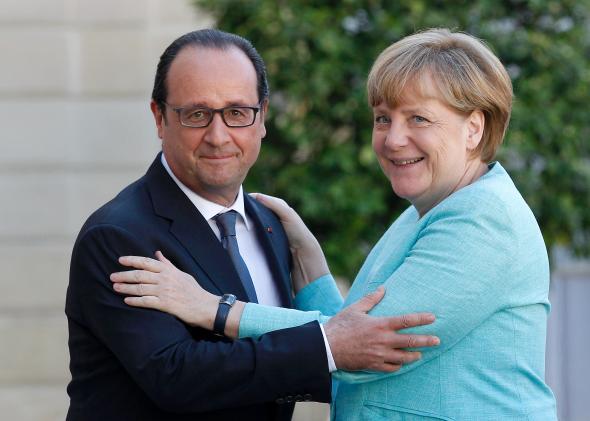The European Union has spent roughly five years fighting to keep Greece inside its fold. So why, after so much effort, do its leaders seem ready to give up and let the Greeks tumble out of the eurozone?
Because they’ve stopped worrying and learned to love the idea of a Grexit. At least, some of them have. Here’s how Der Spiegel explained the shift in January: Back during the bad days of 2012, officials in Berlin and Brussels believed in the “domino theory” of Greece. If it fell, the tremors would reverberate through the financial markets and potentially bring down troubled debtors like Italy, Portugal, and Spain. Today, their thinking has reversed. They’ve adopted “the ‘chain theory,’ which holds that the entire chain would become stronger were its weakest link to be eliminated,” the newspaper explained.
What changed? Compared with three years ago, the EU is in a much better position to fight a financial crisis in one of its members. First, it established a permanent bailout fund, the European Stability Mechanism. Perhaps more importantly, the European Central Bank has been engaging in a massive bond-buying program to try and revive the region’s economy, which should have the side benefit of stopping problems in Greece from causing contagion elsewhere.
Not so long ago, it seemed plausible that if the Greeks left the euro, global investors would panic and start selling off Italian and Spanish bonds for fear that those countries might follow Athens’ lead. That, in turn, would drive up their borrowing costs and cause their national finances to deteriorate, potentially requiring a rescue. But now the ECB, under the leadership of its president, Mario Draghi, is buying €60 billion of assets every month through its quantitative easing program in order to keep bond yields low. That’s a giant reassurance to investors. And even if the markets did freak out, most observers expect that the ECB would step in to buy up however much debt was necessary to calm them.
“The perception, at least, is that the ECB will act if necessary to ensure there are no big dislocations in the rest of the eurozone,” Nick Gartside, chief investment officer for fixed income at JPMorgan Asset Management, told the Financial Times. “One thing we have learnt is never to doubt the creativity of the central bank.”
In other words, if a Grexit starts a brush fire in the financial world, Draghi is standing there with a giant extinguisher, ready to put it out.
That changes the cost-benefit analysis when it comes to keeping Greece in the monetary union. Since a Grexit probably won’t cause an immediate crisis capable of unraveling the eurozone, Germany and the rest of Northern Europe are more concerned that giving into Athens’ pleas for debt relief will set a bad precedent that will encourage left-wingers in countries like Spain to make similar requests. In short, instead of stopping a financial contagion, they’re focused on stopping political contagion.
Not everyone in Europe subscribes 100 percent to the German view of things. France, Spain, and Italy have been more eager to strike a deal with Greece, perhaps in part because if investors do start worrying that other countries could one day be similarly nudged out of the euro, they’re some of the nations most likely to suffer.
For the Greeks, meanwhile, this should all seem sadly ironic. After all, it was Europe’s tight monetary policy in the early days of the financial crisis that helped crater their economy and pushed the government into its standoff with creditors. Now, the ECB’s looser approach could make it easier to push Greece out the door once and for all.
Finally, there is one nightmare situation for Germany in all this. If Greece leaves the euro, then thrives, it could encourage countries like Spain that have suffered greatly under EU austerity to leave, or at least demand softer treatment. In which case, the domino theory might prove to be true, after all.
